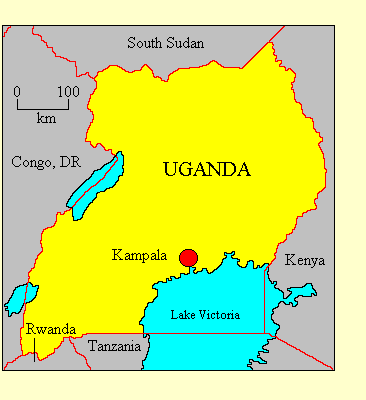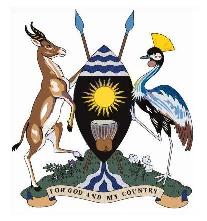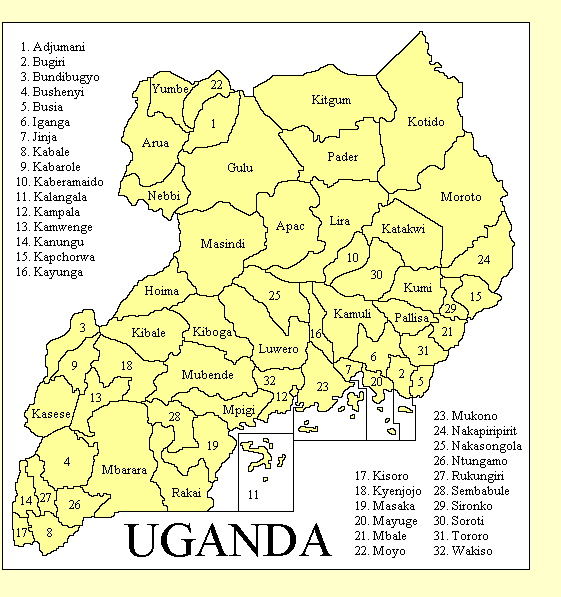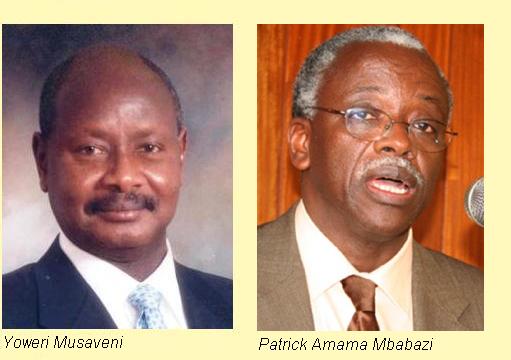

REPUBLIC OF UGANDA
• Official name: Republic of Uganda
• Location: East Africa
• International organisations: African, Caribbean and Pacific Group of States, African Union,
Commonwealth of Nations, Non-Aligned Movement, Organisation of Islamic Conference, United Nations,
World Trade Organisation
• Borders: Congo (Democratic Republic), Kenya, Rwanda, South Sudan, Tanzania
• Coastline: None
• Land area: 236,000 Km2
• Population: 32,400,000
• Annual GDP (PPP) per capita: US$1,300 (2009 CIA estimate). World ranking: 171
• Ethnicity: Uganda's people belong to a very large number of ethnic/linguistic
groups, of which the largest are the Baganda 17%, Ankole 8%, Basoga 8%, Iteso 8%,
Bakiga 7%, and Langi 6%
• Languages: The multitude of African languages spoken in Uganda makes English, the
official language, the essential language of government, media and business.
• Religion: Christian 66% (Catholic 33%, Protestant 33%), Moslem 16%,
indigenous beliefs 18%
• Form of government: Semi-democratic presidential republic. Uganda is divided into 56 districts.
• Capital: Kampala
• Constitution: The Constitution
of Uganda came into effect on 8 October 1995.

• Head of state: The President, elected by direct universal suffrage for a five-year term. The
President dominates the political system.
• Head of government: The Prime Minister, appointed by the President and in practice accountable
to him. Patrick Amama Mbabazi, a former Secretary General of the ruling
National Resistance Movement, has been Prime Minister since 24 May 2011.
• Legislature: The National Parliament
has 292 members, of whom 214 members are elected from single-member constituencies for five-year terms,
and 78 members are elected to represent special interest groups including women, youth and the Army.
• Electoral authority: The Electoral Commission of Uganda
administers national elections.
• Freedom House 2011 rating: Political Rights 5, Civil Liberties 4
• Transparency International Corruption Index: 25% (127 of 178 countries rated)
• Reporters Without Borders Press Freedom 2010 Index: 74.5% (96 of 178 countries rated)
• Heritage Foundation Economic Freedom 2010 Index: 61.7% (80 of 178 countries rated)
Political history
The powerful Kingdom of Buganda controlled most of what is now Uganda from the 17th
century until the arrival of the British in the 19th century. The King of Buganda, a
Moslem, persecuted Christian missionaries, leading to British intervention and the
annexation of the area in 1893. The King continued to be a powerful force in Ugandan politics
under British rule, but the nationalist movement which developed in the 1950s was led
by republicans such as Milton Obote, who became Prime Minister in 1962.
After independence conflict between the King and the government continued. In 1966
Obote made Uganda a republic, abolished Buganda and other kingdoms, and created a one-party
state led by his Uganda People's Congress. Economic difficulties undermined Obote's
popularity and in 1971 he was deposed by the army. The army commander, General Idi Amin,
established one of Africa's most notoriously brutal dictatorships.
The Amin regime ruined Uganda's economy through corruption and by expelling the
Indian business community. In 1979 a rebel army backed by Tanzania overthrew Amin and
there were hopes for the restoration of democracy, or at least civic order. Elections
in 1980 restored Obote to power, but his rule was soon once more unpopular and he was
forced to resign in 1985. In 1986
Yoweri Musevani's National Resistance Army
captured the capital, and Museveni has ruled Uganda since.

Under Museveni press freedom and limited rights of political activity were established,
but his National Resistance Movement monopolised political life for
nearly 20 years. Museveni has been re-elected three times in reasonably fair elections, although
opposition parties were not allowed to operate under the supposedly "non-party democratic"
system. In 2005 the Constitution was altered by referendum to legalise other political parties, and
free multi-party legislative elections are promised for 2011. Opposition parties such as the
Forum for Democratic Change now operate fairly
freely. In fairness to Musaveni it must be said that Uganda has made great economic progress
under his rule and that he continues to face insurgencies by violent religious fundamentalists
in the north.
Freedom House's 2011
report on Uganda
says: "Uganda is not an electoral democracy... The National Assembly has asserted some independence, censuring high-level
executive officials and exercising oversight to influence a number of government actions and policies. However,
significant concerns remain over the ability of opposition parties to compete with the ruling NRM. The opposition is
hindered by restrictive party registration requirements, voter and candidate eligibility rules, the use of government
resources to support NRM candidates, a lack of access to media coverage, and paramilitary groups that intimidate voters
and government opponents... Despite questions over the independence of the electoral commission, Museveni renewed the
panel and reappointed its incumbent chairman in August 2009... Although Uganda has certain measures in place to combat
corruption, including the 2009 Anti-Corruption Bill and the Anti-Corruption Court, the resources to enforce them are generally
lacking... The constitution provides for freedom of speech. Independent print outlets, including more than two dozen daily
and weekly newspapers, are often critical of the government, and several private radio and television stations report on
local politics... The freedoms of association and assembly are officially recognised. However, the 2010 Public Order
Management Bill would require that groups of three or more people receive prior police approval before gathering to discuss
any government actions, failures, or policies... The executive does not guarantee the independence of the judiciary.
Prolonged pretrial detention, inadequate resources, and poor judicial administration impede the fair exercise of justice."
Updated November 2011
|


